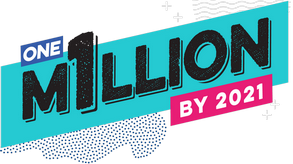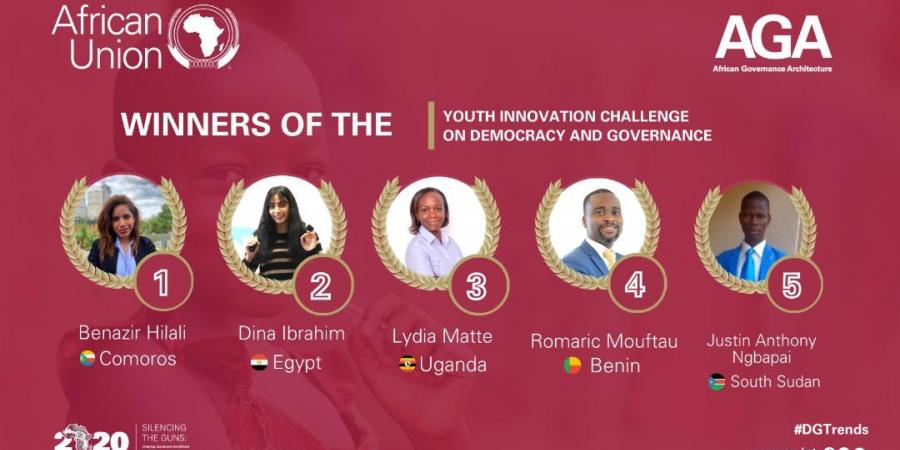Five young innovators have been named winners of the Youth Innovation Challenge on Democracy and Governance in Africa. The winners were unveiled at the 9th High-Level Dialogue Democracy, Human Rights and Governance. The five will benefit from technical support, coaching and mentorship to enable them to scale up their digital or non-digital innovations and be accorded opportunities to showcase their innovation in continental and global platforms.
The finalists were selected from a pool of hundreds of applicants from within the continent and African innovators in the diaspora, from where the initial Top 20 selected innovations were shortlisted eventually leading to the final 5 winners. The selection of the final 5 winners was based on different evaluations carried out during the six months duration of the Challenge that included an Innovation Accelerator program.
These innovations have been lauded for contributing to the realization of Aspirations 3 and 4 of Africa’s Agenda 2063 by advancing solutions that support the structural prevention of conflict by addressing issues of democracy deficit, lack of good governance and contribute to the promotion and protection of human rights.
The Innovation Challenge was launched by the African Union through the African Governance Architecture (AGA) Secretariat, in a joint project with the Common Market for Eastern and Southern Africa (COMESA). The project targeted African innovators, innovation hubs/labs and organizations with a non-profit or for-profit background with initiatives and ideas that are contributing immensely to the culture of good governance, entrenching democratic values, creating social cohesion, bridging social religious and tribal divides, building a common vision, creating platforms for dialogue, blowing the lid on widespread corruption, trafficking of persons and illegal arms and many more - ultimately contributing to creating a peaceful and prosperous Africa - Silencing the Guns. This is aligned to the African Governance Architecture, Youth Engagement Strategy (AGA-YES).
The five winners are:
1. Benazir Hilali, Union of Comoros.
At first place, Benazir runs the Axle Project that aspires to shape the future landscape of governance. By redefining socio-political risks, Axle helps public leaders adopt innovative frameworks to develop Risk Matrix that assesses peace and security challenges arising out of deficits in democratic governance.
2. Dina AboElmaaref Ibrahim, Arab Republic of Egypt.
At the second place, Dina runs the AkhbarMeter Media Observatory Project. AkhbarMeter's monitor the performance of the media outlets in Egypt to identify unprofessional and unethical practices of the viral content using quantitative evaluation method. This is done to curb fake news, media manipulation and provide reliable information to the public through fact-checking. This helps create a less polarized society and contribute to a peaceful and secure Egypt, and Africa at large.
3. Lydia Matte, Republic of Uganda.
Coming in at the third position, Lydia runs the SEMA project. SEMA – Swahili for ‘Speak! What’s up!?’ – aims to improve transparency and accountability of public services in East Africa. SEMA creates user-centred citizen feedback tools for local public offices to give citizens a voice in evaluating these services. By presenting this data in actionable, easy-to-understand ways to local and national governments, SEMA fosters better quality public services that can improve the lives of millions of people.
4. Romaric Mouftaou, Republic of Benin.
At the fourth place, the “Movement for a New Type of Citizen: The Calling of a Generation” Project works to educate citizens to adopt a new mindset about citizenship. The project advocates that citizens should no longer be spectators of the governance of their communities. Rather, that every citizen should become an active stakeholder and partner in spotting the problems of the communities, and in seeking solutions to those problems. The program offers training, run campaigns and courses to inspire citizens to action.
5. Justin Anthony Ngbapai, Republic of South Sudan.
Coming at the fifth position, Justin runs the “Prevention from conflict Related Sexual Violence and Confident building between the civilians and military’s in Western Equatoria in South Sudan”. The project focuses on enhancing the capacity of the civilians, militaries and armed groups to work towards peace by creating an enabling environment for reporting cases related to sexual violence during and after the conflict in South Sudan.
Learn more about the Youth Innovation Challenge on Democracy and Governance in Africa here.
For further information please contact:
Doreen Apollos, Directorate of Information and Communication | African Union Commission | E-mail: ApollosD@africa-union, org | www.au.int|Addis Ababa | Ethiopia
Ms Makda Mikre Tessema: Democracy and Governance Expert: African Governance Architecture MakdaM@africa-union.org



